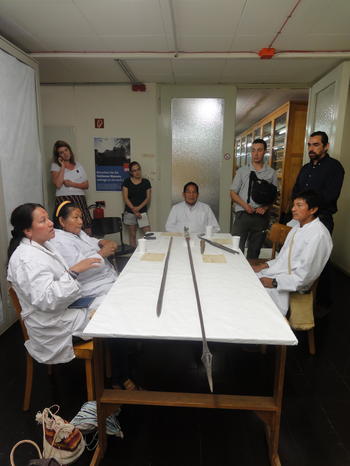Heritage Studies
Austausch zwischen indigenen Expert*innen aus dem Gebiet des Alto Río Negro und Forscher*innen im Ethnologischen Museum zu den dort aufbewahrten "Ethnographica"
Image Credit: Ingrid Kummels
Heritage studies examine the web of relationships between people and what they strive to preserve as natural and cultural heritage. Engaging with the heritage of the past is always about shaping the present and building the future. For a long time, the leaders of nation states, with archives and museums created to meet their needs and financed by the state, shaped the image of a natural and cultural heritage that needed to be preserved, organized, archived, and made accessible to the public primarily for "the nation" or for "mankind." But in the course of the archival turn, among other things, the following has been critically reflected upon: the spatial, social, and epistemic separation that language and music recordings, as well as artifacts of all kinds, have experienced from current repertoires and their bearer societies due to the collecting activities of these institutions.
Exchanges and debates among diverse stakeholders about such contested heritage collections have paved the way for collaborative approaches. These turn to natural and cultural heritages in order to activate them, starting from archival practices of everyday life, in new, equal constellations of cooperation between these interest groups - and especially with the so-called source communities or societies of authors - and to use them sustainably with an orientation towards the future. At the local level, communities' own initiatives engage in everyday practices of archiving and in revitalizing natural and cultural heritage. They do this through agriculture, crafts, art, music, dance, photography, film, and many other activities related to their respective cultural, social, economic, and (identity) political concerns.
The Institute for Latin American Studies's Ancient American Studies/Cultural Anthropology area has been teaching and researching natural and cultural heritage and multiple forms of their restitution/repatriation for decades. The latter include the exchange about as well as the transfer of knowledge, archival practices and infrastructure.
